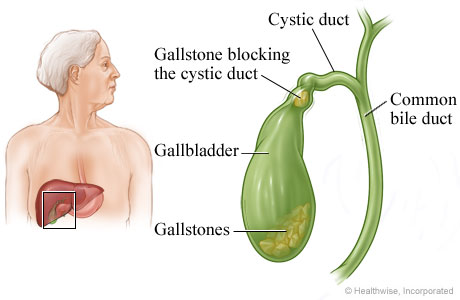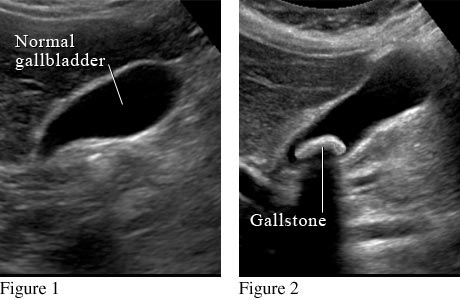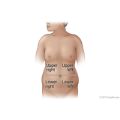Our Health Library information does not replace the advice of a doctor. Please be advised that this information is made available to assist our patients to learn more about their health. Our providers may not see and/or treat all topics found herein.
Gallstones
Condition Basics
What are gallstones?
Gallstones are stones that form in the gallbladder. The gallbladder is a small sac located just under the liver. It stores bile released by the liver. Bile helps you digest fats.
Gallstones form when cholesterol and other substances found in bile make stones. They can also form if the gallbladder doesn't empty as it should.
Gallstones can also form in the common bile duct or cystic duct. These tubes carry bile from the gallbladder and the liver to the small intestine.
Sometimes a thick material called "sludge" forms instead of stones. This can cause the same problems as gallstones.
If stones or sludge block a duct, treatment is usually needed.
What causes them?
Gallstones form when cholesterol and other substances found in bile make stones. They can also form if the gallbladder doesn't empty as it should. Being overweight or having obesity or losing weight quickly may increase the risk of developing gallstones.
What are the symptoms?
Most people who have gallstones don't have symptoms. If you have symptoms, you may have pain in your stomach or the upper right part of your belly. Pain may spread to your back or shoulder blade area. When gallstones block a bile duct, you may have pain, fever, chills, nausea, or vomiting.
How are they diagnosed?
Your doctor will do a physical exam and ask you questions about when the pain in your belly started, where it is, and if it comes and goes or is always there. If your doctor thinks you have gallstones, the doctor may order an abdominal ultrasound or blood tests to confirm the diagnosis.
How are gallstones treated?
If you don't have symptoms, you probably don't need treatment. If you have more than one gallstone attack, or if you have problems from gallstones, you may need to have your gallbladder removed. Sometimes medicines can break up small gallstones.
How can you prevent them?
You can try to reduce your risk of forming gallstones.
- Stay at a weight that's healthy for you. If you need to lose weight, your doctor and a dietitian can help you make a plan. Losing weight too quickly can increase the risk of gallstones.
- Eat a variety of foods that give you the nutrients you need to stay healthy.
- Get 30 minutes of exercise on most days of the week. For many people, walking is a good choice.
Health Tools
Health Tools help you make wise health decisions or take action to improve your health.
Cause

Gallstones develop when cholesterol and other substances in the bile form crystals that become hard stones in the gallbladder. The gallbladder is a small sac located just under the liver. Gallstones can form when too much cholesterol is in the bile or when the gallbladder does not empty properly.
What Increases Your Risk
Your chances of forming gallstones are higher if you:
- Are female. Females are twice as likely as males to have gallstones.
- Are older than 55.
- Are Native American or Mexican-American.
- Have a family history of gallstones.
You may also be increasing your risk for gallstones if you:
- Have obesity.
- Lose weight rapidly or lose weight by dieting.
- Are pregnant.
- Are taking estrogen.
- Do not eat for a long period of time (fasting).
Symptoms
Most people who have gallstones don't have symptoms. When symptoms occur, they can include:
- Pain in the pit of your stomach or in the upper right part of your belly. It may spread to your right upper back or shoulder blade area.
- Pain that may come and go or be steady. It may get worse when you eat.
- Fever, chills, nausea, or vomiting if a gallstone is blocking a bile duct and causing an infection.
- Yellowing of your skin and the whites of your eyes.
Pain can last 15 minutes to 24 hours. Continuous pain for 1 to 6 hours is common. The pain may begin at night and be severe enough to wake you. Pain often starts after eating food that is high in fat. The pain usually makes it hard to get comfortable. Moving around doesn't make the pain go away.
What Happens
Most people with gallstones have no symptoms and do not need treatment.
The most common problem caused by gallstones occurs when a gallstone blocks the cystic duct that drains the gallbladder. It often causes bouts of pain that come and go as the gallbladder contracts and expands. The bouts of pain are often severe and steady. Pain can last 15 minutes to 24 hours. Continuous pain for 1 to 6 hours is common. The pain may get worse after a meal. Symptoms usually improve within a few days.
If the pain is severe or if you have had gallbladder pain before, you may need to have your gallbladder removed.
In rare cases, gallstones can cause pancreatitis, an inflammation of the pancreas. Gallstones back up the flow of digestive enzymes made by the pancreas. Pancreatitis may cause sudden, severe belly pain, loss of appetite, nausea and vomiting, and fever.
Learn more
When to Call
Call 911 or other emergency services immediately if you:
- Have sudden or severe abdominal pain.
- Have trouble breathing.
- Faint or lose consciousness.
Call your doctor now if you have:
- Pain that may be caused by gallstones (continuous moderate to severe pain in the upper right abdomen).
- Pain with a fever, chills, nausea, or vomiting that are clearly not caused by a stomach infection or any other reason.
- Pain in the upper right abdomen, along with a yellow tint to your skin and the white part of your eyes, dark yellow-brown urine, or light-colored stools.
- Gallstone symptoms and you have diabetes or an impaired immune system.
Watchful waiting
Watchful waiting means taking a wait-and-see approach. You and your doctor watch your symptoms or condition to see if you need treatment. It's often the first approach to a first attack of gallstone pain.
Check your symptoms
Exams and Tests
If you have symptoms, your doctor will do a physical exam. The doctor will ask you questions about when the pain in your belly started, where it is, and if it comes and goes or is always there. If your doctor thinks you have gallstones, your doctor may order imaging tests or blood tests to confirm the diagnosis.
The most common test is an abdominal ultrasound. A technologist moves a wand across your belly to create pictures on a screen. Blood tests may be done to find out if gallstones are causing other serious problems or if your symptoms are caused by something else.
What a gallstone looks like on an abdominal ultrasound

Courtesy of Intermountain Medical Imaging, Boise, Idaho.
Figure 1 shows a normal gallbladder on ultrasound. Figure 2 shows a large gallstone in the gallbladder.
Learn more
Treatment Overview
If you don't have symptoms, you probably don't need treatment.
If you do have symptoms and your first gallstone attack causes pain, your doctor may tell you to take pain medicine and wait to see if the pain goes away. You may never have another attack. Waiting to see what happens usually won't cause problems.
If you have a second attack, you may want to have your gallbladder removed. A second attack means you're more likely to have future attacks. Many people have their gallbladders removed. And the body works fine without a gallbladder.
If you have small gallstones and can't have surgery, you may be able to try medicines that break down gallstones.
Learn more
Self-Care
- Rest until you feel better.
- Be safe with medicines. Read and follow all instructions on the label.
- If the doctor gave you a prescription medicine for pain, take it as prescribed.
- If you are not taking a prescription pain medicine, ask your doctor if you can take an over-the-counter medicine.
- Avoid foods that cause symptoms, especially fatty foods. These can make the gallbladder tighten and cause pain.
Surgery
Surgery to remove the gallbladder (cholecystectomy) is the treatment of choice for gallstones that cause moderate to severe pain or other symptoms. Symptoms usually don't return after the gallbladder is removed. Even if you don't have symptoms, surgery may sometimes be done to help prevent problems from gallstones.
Laparoscopic surgery is the most common way to remove the gallbladder. A doctor puts a lighted viewing tool and surgical tools into your belly through several small cuts. People who have this surgery usually recover in about 1 week.
Open surgery involves one larger cut. The gallbladder is removed through this cut. It may be done if laparoscopic surgery isn't an option. Or it may be done when other problems are found during laparoscopic surgery. This type of surgery requires a longer recovery period.
Learn more
Related Information
Credits
Current as of: October 19, 2024
Author: Ignite Healthwise, LLC Staff
Clinical Review Board
All Ignite Healthwise, LLC education is reviewed by a team that includes physicians, nurses, advanced practitioners, registered dieticians, and other healthcare professionals.
Current as of: October 19, 2024
Author: Ignite Healthwise, LLC Staff
Clinical Review Board
All Ignite Healthwise, LLC education is reviewed by a team that includes physicians, nurses, advanced practitioners, registered dieticians, and other healthcare professionals.
This information does not replace the advice of a doctor. Ignite Healthwise, LLC disclaims any warranty or liability for your use of this information. Your use of this information means that you agree to the Terms of Use and Privacy Policy. Learn how we develop our content.
To learn more about Ignite Healthwise, LLC, visit webmdignite.com.
© 2024-2025 Ignite Healthwise, LLC.






